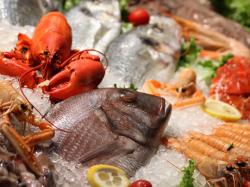Walmart Updates Sustainable Seafood Policies
March 24, 2011 | 2 min to read

More than a billion people around the world rely on farming for their livelihoods, and Walmart is committed to sustainable agriculture and making a positive difference in food production. We have set goals to be completed by the end of 2015 that will help small- and mid-sized farmers expand their businesses, get more income for their products and reduce the environmental impact of farming.
Support farmers and their communities
In the U.S., Walmart will double the sale of locally sourced produce and increase the purchase of select U.S. crops. Globally, we will:
•sell $1 billion in food sourced from 1 million small and medium farmers;
•provide training to 1 million farmers and farm workers – half of which are expected to be women; and
•increase the income of the small and medium farmers we source from by 10 to 15 percent.
Produce more food with fewer resources and less waste
•We’re developing a Sustainable Produce Assessment that will launch in 2011 for top producers in our global food sourcing network. This will help us learn about the water, energy, fertilizer and pesticide used per unit of food produced.
•We will invest more than $1 billion in our global fresh supply chain the next five years to help deliver fresh, quality food with a longer shelf life to our customers.
•By the end of 2015, we will reduce in-store food waste in emerging markets by 15 percent and by 10 percent in other markets.
Sustainably source key agriculture products
•We will require sustainably sourced palm oil for all Walmart private brand products globally by the end of 2015.
•We will only source beef from Brazil that does not contribute to the deforestation of the Amazon rainforest.
Sustainable Seafood
In the United States, we will require all fresh and frozen, farmed and wild seafood products sold at Walmart and Sam’s Club to become certified as sustainable by a third party using Marine Stewardship Council (MSC), Best Aquaculture Practices (BAP) or equivalent standards.
Our goal is to increase the availability of sustainable seafood, and uncertified fisheries must develop plans to achieve certification and report their progress to us regularly. If fisheries fail to meet the timelines established in their plans, Walmart and Sam’s Club will no longer purchase from them.
We will also encourage certifying bodies to create standards for species where no certification standards currently exist. Download the Sustainable Seafood policy.
Heritage Agriculture Program
Our Heritage Agriculture program reintroduces the cultivation of produce in areas where it once grew. As part of our global sustainable agriculture initiatives, we are supporting Heritage Agriculture in key regions of the United States.
Source: Walmart Stores Inc.
